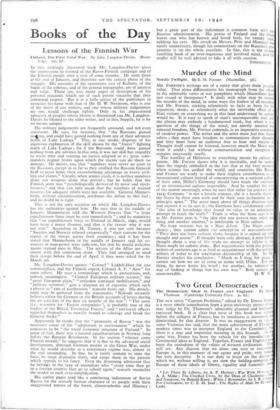Books of the Day
Lessons of the Finnish War
IN this strikingly illustrated book Mr. Langdon-Davies gives the impressions he formed of the Russo-Finnish campaign and of the Finnish people after a visit of some months. He went there at the end of January, and therefore saw the critical phase of the struggle. His accounts of the operations east of Kuhmo, of the battle of the isthmus, and of the general topography, are of interest and value. There are, too, many pages of description of his personal reactions which are of such patent sincerity that they command respect. But it is a little unfair of the publishers to associate his name with that of Mr. H. W. Nevinson, who is one of the finest of our writers, and one whose military judgements no one would challenge lightly. Only in his impassioned advocacy of peoples whose liberty is threatened can Mr. Langdon- Davies be likened to the older writer, and in this, happily, he is by no means unique.
His military judgements are frequently unsound, and not even consistent. He says, for instance that " the Russians gained no4ing, and could have gained nothing from any of their advances north of Lake Ladoga." This, at one stroke, disposes of his ingenious explanation of the skill shown by the " forest " fighting north of Lake Ladoga ; for if the Russians could have gained nothing from any advance in that area, it was not skill but stupidity to waste time and training on tactics adapted to it ; great com- manders neglect fronts upon which the enemy can do them no damage. He insists, too, that " numbers were never an asset to the Russians, except in so far as they enabled the Russian General Staff to press home their overwhelming advantage in heavy artil- lery and planes." Clearly, when armies clash, it is neither numbers alone nor weapons alone that prevail ; but he holds that the Finnish army was " psychologically destroyed by noise and sleep- lessness," and that can only mean that the numbers of trained reserves for adequate reliefs were not available. General Manner- heim, without circumlocution, attributes the defeat to this fact ; and no doubt he is right.
This is not the only occasion on which Mr. Langdon-Davies has the authorities against him. He says that in the middle of January Mannerheim told the Western Powers that " a large expeditionary force must be sent immediately " ; and he maintains that " an expeditionary force to Finland in March, 1940, would have been a major disaster, and that is the reason why it was not sent." According to M. Tanner, it was not sent because " Sweden and Norway refused categorically " their consent for the transit of the troops across their countries ; and it has been stated that Mannerheim in the middle of January said his re- sources in man-power were sufficient, but that he would welcome 30,000 trained men in May. The actions of the Allies are con- sistent with this contention alone. They had arranged to send their troops before the end of April, if they were asked for by March 5th.
Mr. Langdon-Davies quotes " Colonel " Liddell-Hart for one commonplace, and the Finnish expert, Colonel A. F. " Airo " for some others. He uses a terminology which is pretentious, and, indeed, meaningless. " Central European military science," the " great European plain," " orthodox continual mobilisation," and " military scientists " give a spurious air of expertise which such a phrase as " rate of acceleration " scarcely bears out. His detach- ment may be gathered from the statements; " Nobody seriously believes either the German or the British accounts of losses during the air activities of the first six months of the war "; " The same (i.e., notoriety for Fascist sympathies '), is probably true of the leaders of the British Territorial Forces," and " territorial officers regarded themselves as morally bound to sabotage and break the General Strike."
Apparently he thinks that the " proximity of Russia " was the necessary cause of the " adaptation to environment " which he conceives to be " the social economic structure of Finland." In point of fact, there was a natural equalitarianism in Norway long before the Russian Revolution. In his section " whence came Finnish morale," he suggests that it is due to the advanced social development, although German morale in the Great War, under what he would describe as a reactionary regime was, almost to the end astounding. In fine, he is rarely content to state the facts, he must dramatise them, and range them in the pattern which appeals to his fancy. Even the disarming admission that he belongs to the type of journalists who " every time they go to a foreign country they go to school again," scarcely reconciles the reader to such over-simplification.
His earlier pages read like a convincing indictment of Soviet Russia for the scarcely human character of its people with their exaggerated terrors of the forest, claustrophobia and illiteracy ;
but a great part of the indictment is common form with any Russian administration. His praise of Finland and the Finn! leaves one who has known and loved both, for twenty y rubbing his eyes. His attack on Messrs. Pritt and Montagu was surely unnecessary, though his commentary on the Kuusinen pro. gramme is on the whole excellent. In fine, this is the strange rambling book of an over-ingenious and involved mind, and the reader will be well advised to take it all with caution.
STRATEGICUS.


























 Previous page
Previous page